Not long ago, I was here, in this fascinating #hivebookclub community, talking to you about two commendable plays by Oscar Wilde, and excited to remember his work, I’m inspired to bring you this recommendation so that if you haven’t read it yet, you rush to find it immediately.
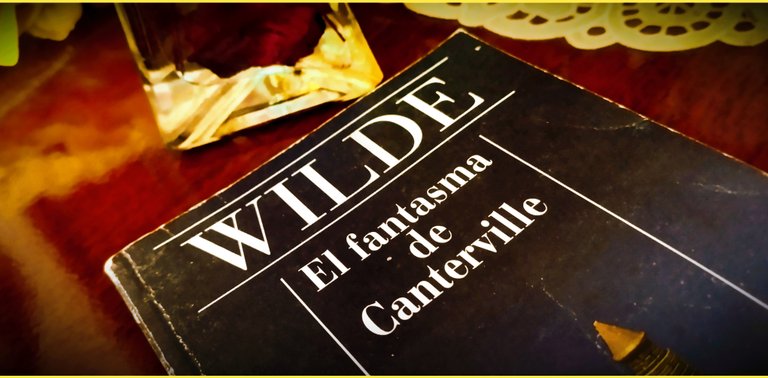
This time, Wilde surprises us with a tale that blends the gothic and the ironic in The Canterville Ghost, where what at first glance seems like a traditional horror story, with a tormented specter and a haunted mansion, is subverted with his usual literary skill.
Let me tell you, to encourage you to read it, that it all begins with the Otis family, an American family that moves to Canterville, into a mansion that appears to have a supernatural tenant: the ghost of Sir Simon, who, like any self-respecting ghost, has spent centuries tormenting its inhabitants with bloody apparitions and heart-wrenching moans.
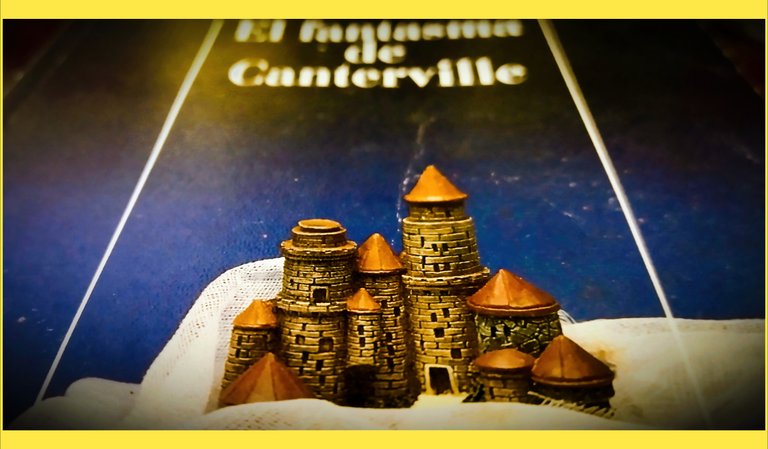
Contrary to expectations, this family is not intimidated and, instead of fleeing, responds with pure rationality and mockery. Imagine: they clean bloodstains with detergent, offer lubricant to the ghost’s rusty chains, and even throw pillows at him the moment he appears.
And as one would expect from Wilde, an atmosphere is built between the ominous and the comical, for while the mansion is described in a way that evokes the typical terror of Poe, glimpses of farce emerge. Thus, Sir Simon, who had been accustomed to causing heart attacks, is reduced to a ridiculous actor, and here the terror lies not in the supernatural but in the ghost’s own vulnerability and irrelevance.
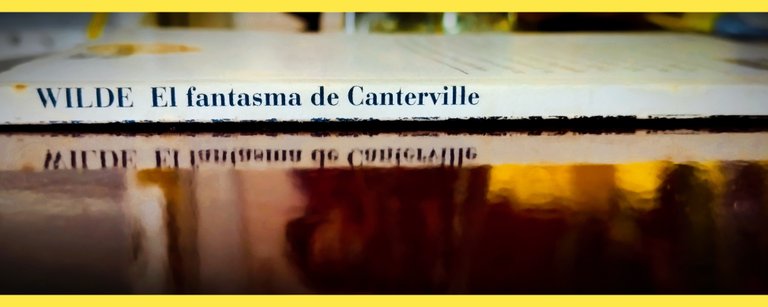
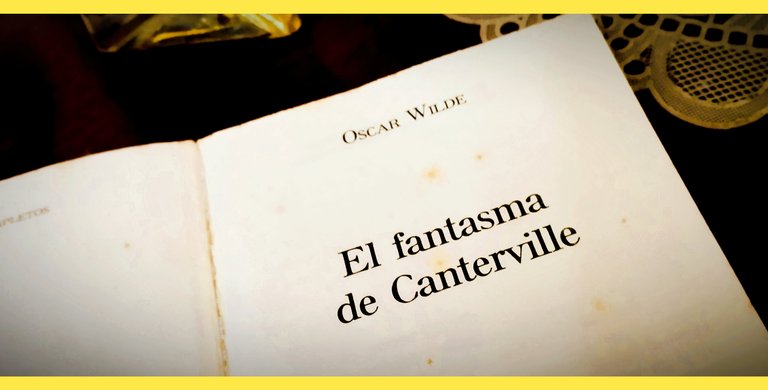
Wilde humanizes the ghost’s pain, who ceases to be a monster and becomes a soul trapped in his past. Through curious flashbacks, we learn that he murdered his wife, and his in-laws condemned him to wander eternally, dying of starvation. An intriguing character is Virginia Otis, the teenage daughter of the family, who, while the others treat the specter as a nuisance, is the only one who perceives his suffering. It is in these moments that the author abandons satire to delve temporarily into themes as profound as redemption and compassion, without falling into cheap sentimentality.
This story demonstrates that Wilde could master any genre. Here, horror is not about fear but a tool to mock the gothic, to question morality, and ultimately, to move us. We are in the presence of impeccable prose, elegant in its descriptions, with an impressive balance between the grotesque and the lyrical. It’s perfect for those seeking more than just chills because, in the end, this is a metaphor about loneliness and the weight of our history. It’s harsh, I know, but what Wilde shouts to us through his pages is that even ghosts need to be seen.
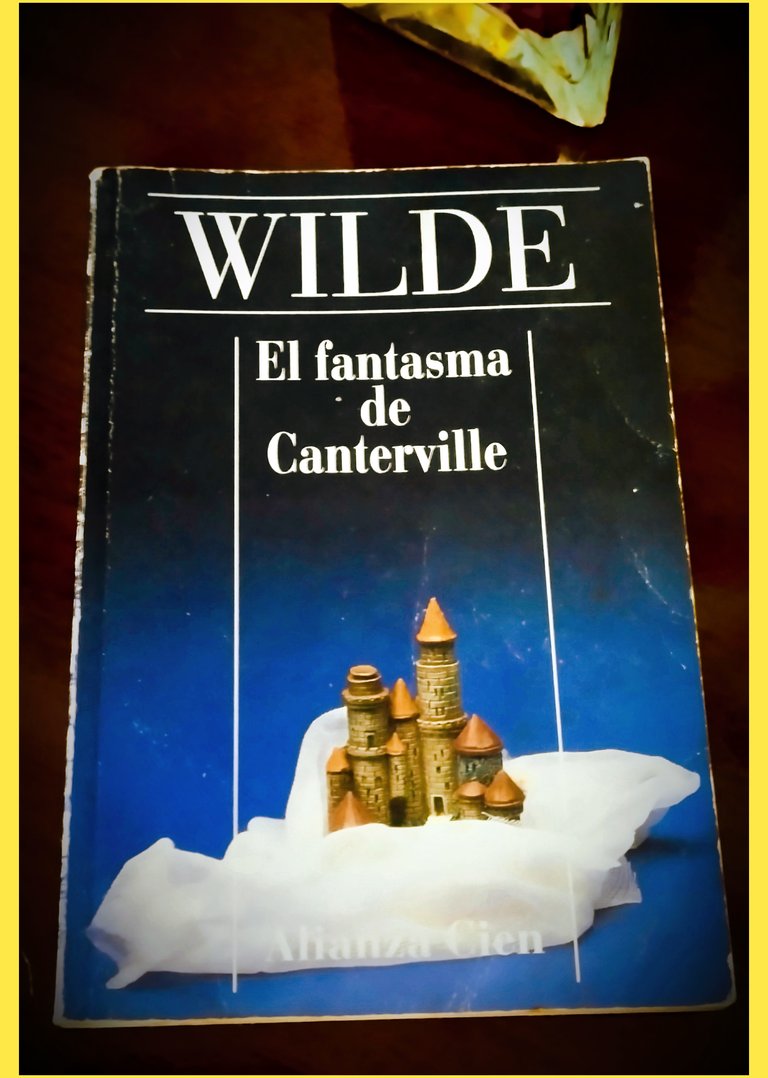
I hope you seek out The Canterville Ghost and devour it in one sitting… I’ll soon return with another Wilde recommendation that I know you’ll adore.

https://ecency.com/hive-180164/@neuropoeta/the-importance-of-being-oscar


✨ 𝑻𝒉𝒂𝒏𝒌𝒔 𝒇𝒐𝒓 𝒓𝒆𝒂𝒅𝒊𝒏𝒈! ✨
𝑰𝒇 𝒚𝒐𝒖 𝒅𝒐𝒏’𝒕 𝒌𝒏𝒐𝒘 𝒎𝒆 𝒚𝒆𝒕—𝑰’𝒎 𝒂 𝑪𝒖𝒃𝒂𝒏 𝒏𝒆𝒖𝒓𝒐𝒍𝒐𝒈𝒊𝒔𝒕 𝒂𝒏𝒅 𝒘𝒓𝒊𝒕𝒆𝒓, 𝒂 𝒎𝒐𝒕𝒉𝒆𝒓, 𝒂 𝒘𝒐𝒎𝒂𝒏, 𝒂𝒏𝒅 𝒂 𝒅𝒓𝒆𝒂𝒎𝒆𝒓 𝒘𝒉𝒐’𝒔 𝒇𝒐𝒖𝒏𝒅 𝒊𝒏 𝑯𝒊𝒗𝒆 𝒂 𝒃𝒆𝒂𝒖𝒕𝒊𝒇𝒖𝒍 𝒔𝒑𝒂𝒄𝒆 𝒕𝒐 𝒔𝒐𝒂𝒓.
𝑨𝒍𝒍 𝒕𝒆𝒙𝒕 𝒂𝒏𝒅 𝒊𝒎𝒂𝒈𝒆𝒔 𝒂𝒓𝒆 𝒎𝒚 𝒐𝒓𝒊𝒈𝒊𝒏𝒂𝒍 𝒄𝒓𝒆𝒂𝒕𝒊𝒐𝒏𝒔, 100% 𝒉𝒖𝒎𝒂𝒏-𝒎𝒂𝒅𝒆 (𝒏𝒐 𝑨𝑰).
𝑩𝒂𝒏𝒏𝒆𝒓 𝒅𝒆𝒔𝒊𝒈𝒏𝒆𝒅 𝒃𝒚 𝑳𝒖𝒎𝒊𝒊.
𝑳𝒐𝒗𝒆𝒅 𝒕𝒉𝒊𝒔 𝒑𝒐𝒔𝒕? 𝑼𝒑𝒗𝒐𝒕𝒆, 𝒄𝒐𝒎𝒎𝒆𝒏𝒕, 𝒐𝒓 𝒓𝒆𝒃𝒍𝒐𝒈 𝒕𝒐 𝒔𝒑𝒓𝒆𝒂𝒅 𝒕𝒉𝒆 𝒘𝒊𝒏𝒈𝒔 𝒐𝒇 𝒄𝒓𝒆𝒂𝒕𝒊𝒗𝒊𝒕𝒚! 💛

VERSIÓN EN ESPAÑOL

El arte de reinventar el terror en Oscar Wilde
Hace muy poco estaba por acá, en esta fascinante comunidad de #hivebookclub, hablándoles de dos encomiables obras de teatro de Oscar Wilde, y entusiasmada por recordar su obra, me animo a traerles esta propuesta para que, si no la han leído, corran urgentemente a buscarla.

Esta vez Wilde nos sorprende con un relato que fusiona lo gótico y lo irónico en El fantasma de Canterville, donde lo que a primera vista pareciera un cuento de terror tradicional, con un espectro atormentado y una mansión embrujada, lo logra subvertir con su habitual destreza literaria.
Les cuento, para que se animen a leerla, que todo comienza con la familia Otis, una familia norteamericana que se muda a Canterville, a una mansión que parece tener un inquilino sobrenatural: el fantasma de Sir Simon, que, como todo fantasma que se respete, lleva siglos atormentando a los moradores con apariciones sangrientas y gemidos desgarradores.

Contrario a lo esperado, esta familia no se intimida y, en lugar de huir, responde con pura racionalidad y burla. Imaginen: limpian las manchas de sangre con detergente, le ofrecen lubricante a los grilletes oxidados del fantasma y hasta le lanzan almohadas en cuanto efectúa sus apariciones.
Y como cabría esperar de Wilde, se construye una atmósfera entre lo ominoso y lo cómico, ya que mientras se describe la mansión de modo que se evoca el terror típico del maestro Poe, aparecen atisbos de bufonería. Entonces, Sir Simon, que había estado acostumbrado a provocar infartos, se ve reducido a un actor ridículo, y aquí el terror no reside en lo sobrenatural, sino en la vulnerabilidad del propio fantasma y en su irrelevancia.


Wilde humaniza el dolor del fantasma, que ya deja de ser un monstruo para ser un alma atrapada en su pasado, y entonces nos enteramos, en unos curiosos flashbacks, que asesinó a su esposa y que sus suegros lo condenaron a vagar eternamente, muriendo así de inanición. Un personaje curioso es Virginia Otis, la hija adolescente de la familia, que, mientras los demás tratan al espectro como una molestia, es la única que percibe su sufrimiento. Justo en esos momentos, el autor abandona la sátira para adentrarse temporalmente en temas que nos llegan tan profundos como la redención y la compasión, sin caer en el sentimentalismo barato.
Este relato demuestra que Wilde podía dominar cualquier género. Aquí el terror no es susto, sino herramienta para reírse de lo gótico, para cuestionar la moral y, en última instancia, para conmover. Estamos en presencia de una prosa impecable, elegante en las descripciones y con un impresionante equilibrio entre lo grotesco y lo lírico. Es perfecto para quienes buscan algo más que escalofríos, porque, al fin y al cabo, esto viene siendo una metáfora sobre la soledad y el peso de nuestra historia. Es duro, lo sé, pero lo que Wilde nos grita en sus páginas es que hasta los fantasmas necesitan ser vistos.

Espero que busquen El fantasma de Canterville y lo consuman de un tirón… pronto regreso con otra propuesta de Wilde, que sé que adorarán.

https://ecency.com/hive-180164/@neuropoeta/the-importance-of-being-oscar


✨ ¡𝑮𝒓𝒂𝒄𝒊𝒂𝒔 𝒑𝒐𝒓 𝒍𝒆𝒆𝒓! ✨
𝑺𝒊 𝒂ú𝒏 𝒏𝒐 𝒎𝒆 𝒄𝒐𝒏𝒐𝒄𝒆𝒔: 𝒔𝒐𝒚 𝒏𝒆𝒖𝒓ó𝒍𝒐𝒈𝒂 𝒚 𝒆𝒔𝒄𝒓𝒊𝒕𝒐𝒓𝒂 𝒄𝒖𝒃𝒂𝒏𝒂, 𝒎𝒂𝒅𝒓𝒆, 𝒎𝒖𝒋𝒆𝒓 𝒚 𝒔𝒐ñ𝒂𝒅𝒐𝒓𝒂 𝒒𝒖𝒆 𝒆𝒏𝒄𝒐𝒏𝒕𝒓ó 𝒆𝒏 𝑯𝒊𝒗𝒆 𝒖𝒏 𝒉𝒆𝒓𝒎𝒐𝒔𝒐 𝒆𝒔𝒑𝒂𝒄𝒊𝒐 𝒑𝒂𝒓𝒂 𝒗𝒐𝒍𝒂𝒓.
𝑬𝒍 𝒕𝒆𝒙𝒕𝒐 𝒚 𝒍𝒂𝒔 𝒊𝒎á𝒈𝒆𝒏𝒆𝒔 𝒔𝒐𝒏 𝒅𝒆 𝒎𝒊 𝒂𝒖𝒕𝒐𝒓í𝒂, 100% 𝒉𝒖𝒎𝒂𝒏𝒐𝒔 (𝒔𝒊𝒏 𝑰𝑨).
𝑩𝒂𝒏𝒏𝒆𝒓 𝒅𝒊𝒔𝒆ñ𝒂𝒅𝒐 𝒑𝒐𝒓 𝑳𝒖𝒎𝒊𝒊.
¿𝑻𝒆 𝒈𝒖𝒔𝒕ó 𝒆𝒔𝒕𝒂 𝒑𝒖𝒃𝒍𝒊𝒄𝒂𝒄𝒊ó𝒏? 𝑽𝒐𝒕𝒂, 𝒄𝒐𝒎𝒆𝒏𝒕𝒂 𝒐 𝒓𝒆𝒃𝒍𝒐𝒈𝒖𝒆𝒂 𝒑𝒂𝒓𝒂 𝒂𝒚𝒖𝒅𝒂𝒓 𝒂 𝒅𝒆𝒔𝒑𝒍𝒆𝒈𝒂𝒓 𝒆𝒔𝒕𝒂𝒔 𝒂𝒍𝒂𝒔. 💛


